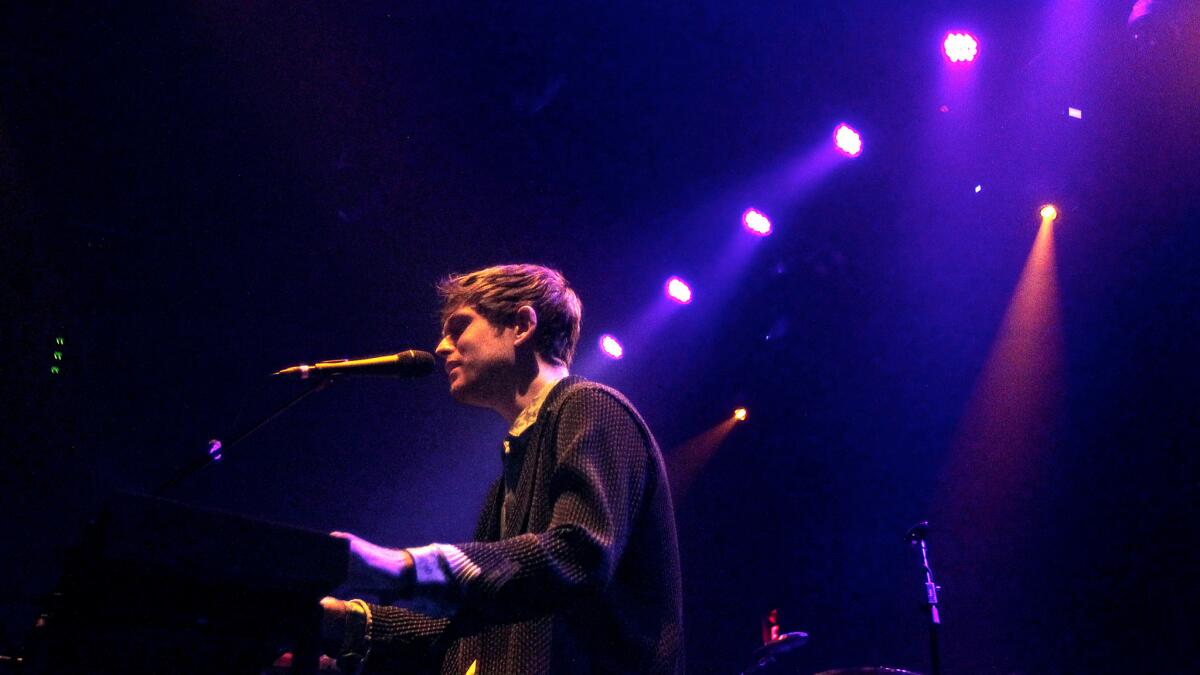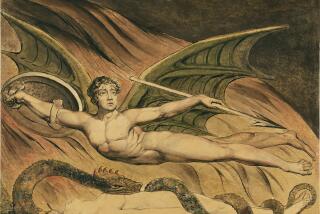After âLemonade,â James Blake measures his success at the Belasco Theater

James Blake makes beautiful music about feeling miserable. In his exquisitely rendered songs, which connect twitchy English dubstep to slow-burn American R&B, the narrator is always lamenting the disappearance of something: love, mostly, but also childhood, community, the long attention spans people had before the iPhone. Each loss is a wound, and each wound requires licking.
Yet misery wasnât the state Blake was in Monday night at the Belasco Theater, where he played the first show of a brief tour behind his new album, âThe Colour in Anything.â Asked by an audience member how he was doing, the 27-year-old singer and keyboardist thought for a second and replied, âI couldnât be happier.â
Well, sure. Before he released âThe Colour in Anythingâ this month (mere hours after announcing the record was coming), Blake received a huge boost when he appeared as a songwriter and guest vocalist on BeyoncĂŠâs âLemonade.â
Her endorsement was just the latest in a series of commendations since Blakeâs previous album, 2013âs âOvergrown,â won the UKâs prestigious Mercury Prize and inspired Kanye West, in a radio interview, to call Blake his favorite artist. Blake also has been reportedly working with Frank Ocean on the highly anticipated follow-up to that singerâs âChannel Orange.â
So you could understand the contentment he copped to Monday. When Blake looks out at modern pop, from superstars such as BeyoncĂŠ and Drake to hip up-and-comers like the indie-soul trio Wet, he sees a world heâs helping to shape. Whatâs interesting is that his music, whether through a deeper sadness or a commitment to his brand, remains hurt, cloistered, dejected; indeed, âThe Colour in Anythingâ might be his gloomiest â and prettiest â yet, with songs about âa lonely off-white roomâ and how âwe live too long to be so loved.â
At the Belasco, Blake capably reproduced the albumâs intricate arrangements with help from guitarist Rob McAndrews and drummer Ben Assiter. âTimelessâ layered darting synth lines over a head-nodding beat, while âChoose Meâ built methodically to a forbidding climax, like a tidal wave made of visible droplets. For âRadio Silence,â in which Blake sings, âI canât believe that you donât want to see me,â the singer used a piece of gear to construct a quick vocal loop, then harmonized with himself â a neat metaphor for the self-obsession that runs through his work.
Later, he brought out two musician friends, Moses Sumney and Connan Mockasin, to add a churchy human touch to the new recordâs title track. But more often Blake was drawing out the isolation in his music, as in the anxious âI Hope My Lifeâ and an older song, âVoyeur,â which stretched into a long dance remix whose slithering bass line and industrial-funk groove recalled âHead Like a Holeâ by Nine Inch Nails.
Blake closed with âModern Soul,â a meditative track from âThe Colour in Anythingâ that had him repeating âI want it to be overâ probably two dozen times. And though heâd basically said he was enjoying his success, the insistence in his voice made you wonder: Had happiness made him fear losing touch with anguish?
Twitter: @mikaelwood
More to Read
The biggest entertainment stories
Get our big stories about Hollywood, film, television, music, arts, culture and more right in your inbox as soon as they publish.
You may occasionally receive promotional content from the Los Angeles Times.











